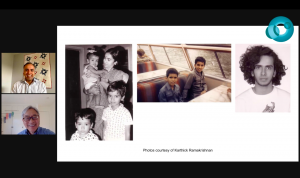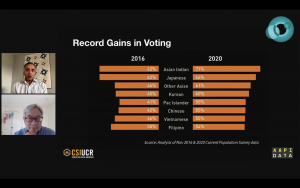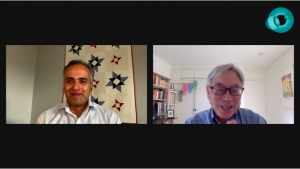On Thursday, July 22, CAAM’s Executive Director Stephen Gong sat down with political scientist Karthick Ramakrishnan to discuss his upbringing and his past and current projects, including AAPI Data, California 100, and New Declaration. The hour-long conversation not only gave insight into Karthick’s current work, but also shed light on his values and inspirations, and the future of AAPI communities as a whole.
Our guest Storyteller credited his keen sense of fairness and unfairness of life early in his childhood for paving the way for his future public policy work. As the middle child of Indian immigrants to Canada, Karthick learned at an early age to watch out for the underdog, though he got his own fair share of getting beat up and being called names in the blue-collar neighborhood where he and his family lived. He reminisced about what it was like to watch his every word and action in an attempt to “fit in,” feeling as though somehow, he was a representative or ambassador of India. “People talk about assimilation as if it’s a natural and neutral process,” said Karthick, “but it’s actually a pretty painful process involving ridicule at the very least, but sometimes beyond that.” It was only through this realization that in high school, he stopped trying to assimilate, but rather revelled in standing out–and he still had the photographic proof. He shared a photo of his long hair to the audience, joking, “A word of advice to young people: if you have hair, just flaunt it. You’ll never know when you’ll get it back quite in the same way.” Hair aside, high school Karthick also became a columnist for the school newspaper, which encouraged him to try to change public opinion and influence public perception, a passion which would soon become his life’s work.

Graduate school at Princeton University also informed Karthick’s current public policy endeavors. For one thing, he was more involved in extracurricular activities than he had been as an undergraduate at Brown University; he was one of the co-founders of the first South Asian student theater group in the country, Princeton South Asian Theatrics (PSAT), where they wrote original plays and skits for cultural shows. Secondly, he was able to explore other interests at Princeton, including film and video production, demography, and statistics, some of which gave way to new opportunities. The American Political Science Association accepted Karthick’s paper on immigrant voting across racial groups and immigrant generations, and invited him to speak on a panel with other scholars, of whom were cited in his paper. Despite Karthick’s excitement, there had only been four people in the audience of the panel–and that’s when it hit him that he didn’t aspire for this kind of impact on the world. He wanted to speak to mass audiences. This drive would lead him to the creation of AAPI Data.
AAPI Data was an idea born out of the need to change cultural narratives. In the presidential race of 2008 where Barack Obama ran against Hillary Clinton, Karthick recalled that Clinton had the strongest support out of any group of Asian Americans. The public had been quick to respond, yet instead of questioning the significance of the Clinton administration to Asian American communities, the media had critiqued the characters of Asians–why didn’t Asians like Black people?–despite that there was nothing in the data about racial attitudes. It was at this moment that Karthick realized that his work in collecting data around this election could not wait; ideas about racial attitudes were already sinking into mainstream perception. He needed to get data fast to change these cultural narratives.
The AAPI Data project took flight when, in 2012, a reporter called Karthick, asking data questions about the Vietnamese American population in Orange County. Karthick showed him how to look up the data online, and that was when it hit Karthick that everyone should know and have access to these numbers. Since then, Karthick has been hard at work developing and curating AAPI Data. Not only have Karthick and his team created a think tank for the AAPI community and achieved their initial goal of having online presence, they also earned the trust of and helped inform journalists, academics, government agencies, and communities alike.

AAPI Data is not simply about numerical statistics. During the Session, Karthick dispelled this restrictive thought as he explained his “Data, Narrative, and Action (DNA)” framework, which emphasizes the importance of the interconnectedness between numbers, stories, and impact, and how they inform that drive toward making social change. Data, especially disaggregated data, is essential and provides systematic evidence that cannot be easily dismissed. Narratives are equally important, as the way data is framed through messaging and storytelling can be a tool for public recollection and the empowerment of communities. Lastly, “Action” derives from a combination of utilizing both data and narratives, and includes changes in policies, practices, resources, mindsets, and power dynamics, to inform our everyday ideologies and values.
Karthick’s work didn’t stop with AAPI Data. The political scientist shared that since November 2020, he is also the executive director of California 100, an initiative focused on identifying and uplifting transformative ideas, people, and projects that accelerate progress towards a shared vision of the future. The project urges people to think intergenerationally, over the span of one hundred years, to ensure that California remains a state of innovation and inclusion. It is more important now more than ever, said Karthick, especially emerging from the current COVID-19 pandemic, as many systems are in desperate need of radical design. California 100 challenges people to rethink the ways in which everyone is aided and uplifted to reach a more equitable, sympathetic California.
Karthick also introduced his New Declaration project, a movement striving to build a union amongst Americans, one that affirms the critical importance of interdependence, diversity, and equity for everyone. As the 250-year anniversary of the Declaration of Independence approaches, New Declaration acts as an outlet for people to take part in a reckoning of America’s past in terms of truth, reconciliation, and healing, and to move forward into the future with a positive vision. New Declaration challenges people to meditate deeply about the fundamental truths of life, liberty, and the pursuit of happiness. The project guides reflections on what it means to be alive (especially amidst the pandemic); what life, liberation, and the pursuit of happiness means; and what a reimagined declaration would look like and why. Through these prompts, New Declaration strives to support artists and marginalized communities, engage for-profit and nonprofit organizations, and inspire Americans across the country.

As the hour-long conversation wrapped to a close, Karthick left us with some of his thoughts on the future of AAPI communities. The researcher disclosed that he believes that Asian American communities are in the process of great transformation; since the turn of the twenty-first century, there has been strong levels of civic engagement. Asian Americans and Pacific Islanders had been voting and running for office and positions in public service. Take 2020, for instance–not only was it a year of a pandemic and a rise in hate crimes, but it also yielded the first (female) Asian American Vice President. Karthick urged his audience to not take this achievement of representation for granted. Instead of conforming to white society as we know it by acting the “right” way, we instead need to focus our attention on dismantling systems of white privilege and white supremacy. Only then can Asian Americans–and other marginalized communities–achieve liberation.
Follow Karthick and his work:
- Learn more about Karthick’s work at his website and follow him on Facebook and Twitter.
- Learn more about, explore, and share AAPI Data’s demographic data and policy research here.
- Participate in Karthick’s new initiative, New Declaration, here.
- Join Karthick’s new project, California 100, and help co-create an innovative, sustainable, and equitable next century for all Californians.
Watch the conversation on our YouTube Channel here (closed captions are available):
Sign up for CAAM’s e-newsletter, CAAM Connect, for information on future Storytellers Sessions, updates on Asian American media, and more!
CAAM members receive free admission to special events like Storytellers Sessions throughout the year and exclusive benefits to our 40th anniversary CAAMFest in 2022. Join today!
This recap was written by CAAM’s Membership and Fundraising Projects intern Lisa Lai.


